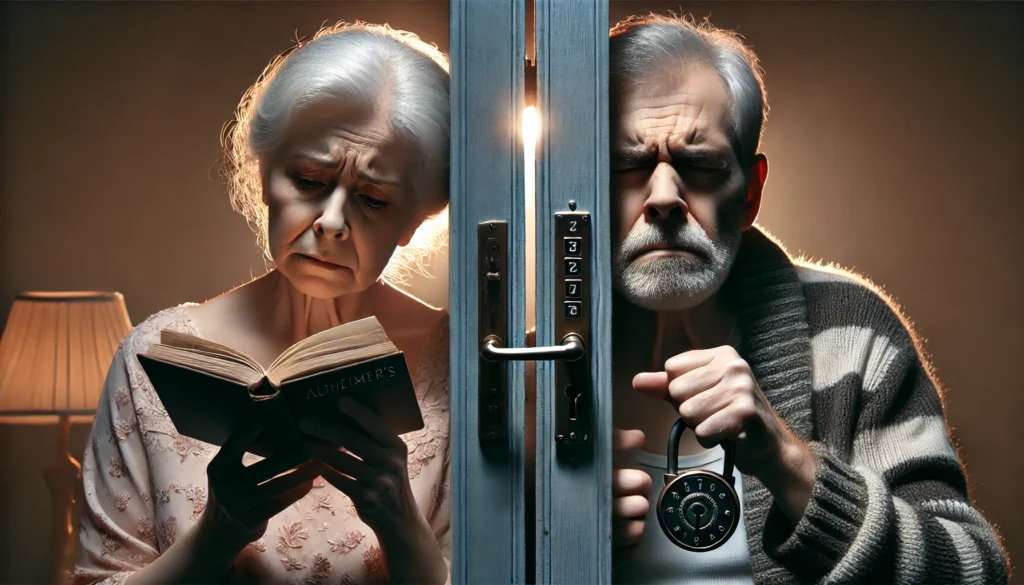Introduction
Confusion between dementia and Alzheimer’s disease is widespread, and with good reason. Both conditions profoundly impact memory, cognition, and daily function, but they are not the same. As more families confront cognitive decline in loved ones, the need to understand dementia vs Alzheimer symptoms becomes increasingly important. At the same time, many people struggle with seemingly small but revealing misunderstandings, like how to spell dementia correctly or believing the disease is called “altimeters dementia.”
You may also like: How to Stop Cognitive Decline: Science-Backed Steps for Prevention and Brain Longevity
These misconceptions reflect deeper gaps in awareness that can delay diagnosis and care. The distinction between dementia and Alzheimer’s is not just semantic—it can shape everything from treatment approaches to caregiving strategies. Moreover, understanding the public confusion around terms like “altimeters dementia” offers insight into how complex medical concepts are filtered through popular culture, misheard words, and fear.
This article provides a comprehensive look at the symptoms that define dementia as a syndrome, the unique progression of Alzheimer’s as a specific disease, and the linguistic and cultural reasons why terms like “altimeters” have gained traction. We also explore why learning how to spell dementia correctly reflects the beginning of a broader, deeper health literacy journey for families and caregivers alike.

What Is Dementia and How Is It Diagnosed?
Dementia is not a single disease but a syndrome, a collection of symptoms that impair memory, reasoning, language, and judgment. It is an umbrella term used to describe a wide range of cognitive impairments that interfere with a person’s ability to function independently. Understanding dementia vs Alzheimer symptoms begins with grasping this fundamental distinction: Alzheimer’s is a type of dementia, but not all dementia is Alzheimer’s.
Dementia is diagnosed through a combination of medical history, neurological exams, cognitive tests, imaging studies, and sometimes blood tests to rule out other conditions. Symptoms must be persistent and progressive to meet clinical criteria, meaning they do not fluctuate dramatically from day to day. Key early signs include forgetfulness, language difficulties, poor problem-solving skills, and confusion in familiar environments.
Physicians often categorize dementia based on its underlying cause. Common types include Alzheimer’s disease, vascular dementia, Lewy body dementia, and frontotemporal dementia. Each type has its own progression, cognitive profile, and treatment approach. But across all types, understanding the core symptoms of dementia is crucial for early recognition and care planning.
Alzheimer’s Disease: The Most Common Form of Dementia
Alzheimer’s disease accounts for 60-80% of all dementia cases. It is a specific neurodegenerative disorder marked by the accumulation of amyloid plaques and tau tangles in the brain, leading to cell death and brain shrinkage over time. One of the clearest ways to distinguish dementia vs Alzheimer symptoms is to look at how Alzheimer’s unfolds in a more predictable, stage-based manner.
Early signs of Alzheimer’s include short-term memory loss, misplaced items, difficulty finding words, and challenges with routine tasks. As the disease progresses, symptoms intensify, leading to disorientation, mood swings, aggression, and eventually a loss of speech and motor functions. Unlike some other forms of dementia, Alzheimer’s tends to follow a slow but steady decline.
Although age is the greatest risk factor, Alzheimer’s is not a normal part of aging. It is a pathological process that can begin decades before symptoms appear. Genetics, lifestyle, cardiovascular health, and head trauma all play a role in susceptibility. Treatments can slow progression or ease symptoms, but there is currently no cure.

How to Spell Dementia: Why It Matters
The word “dementia” is often misspelled or misheard, especially in communities less familiar with medical terminology. Common misspellings include “damentia,” “dimensia,” and “dementhia.” Even when spoken correctly, it is sometimes heard as “altimeters,” leading to the widely circulated but incorrect term “altimeters dementia.”
While it may seem trivial, learning how to spell dementia properly is a foundational step in health literacy. It enables people to search for accurate information, communicate clearly with healthcare providers, and avoid the confusion that comes with using the wrong terms. When caregivers or family members Google “altimeters dementia,” they may be misdirected to non-medical pages or even misinformation.
Spelling reflects understanding. When someone takes the time to ask how to spell dementia, they are expressing a desire to engage more deeply with the topic. That small action can lead to better awareness, earlier interventions, and more supportive care environments.

Decoding the “Altimeters Dementia” Misconception
The term “altimeters dementia” has no medical meaning but is a phonetic misinterpretation of “Alzheimer’s dementia.” The word “Alzheimer’s” is unfamiliar to many people, and when spoken quickly or in certain accents, it can sound like “altimeter,” a device used to measure altitude.
This kind of linguistic error is common with unfamiliar or complex medical terms, especially when they are first encountered during moments of stress or crisis. A family member may hear a diagnosis in a hospital and, overwhelmed by emotion, retain only a misheard version of the term. They then repeat “altimeters dementia” to others, reinforcing the error.
While seemingly harmless, this miscommunication can have real consequences. It may delay access to reliable resources, hinder effective communication with healthcare providers, and contribute to confusion about symptoms, treatment, and progression. Correcting the term gently and without judgment is important. It offers an opportunity to foster understanding and clarify what Alzheimer’s actually is.
Key Differences Between Dementia vs Alzheimer Symptoms
To truly understand dementia vs Alzheimer symptoms, it’s helpful to compare the conditions side by side.
Dementia, as a syndrome, includes a range of cognitive impairments that interfere with daily functioning. These can be caused by multiple diseases. Symptoms may vary widely depending on the underlying cause. For example, vascular dementia often involves sudden changes after a stroke, while Lewy body dementia includes vivid hallucinations and sleep disturbances.
Alzheimer’s disease, on the other hand, typically begins with subtle memory lapses and advances in a consistent pattern. Language skills, executive function, and orientation decline progressively. Unlike some forms of dementia that fluctuate or improve temporarily, Alzheimer’s tends to worsen steadily over time.
Both conditions can include personality changes, confusion, and behavioral disturbances, but the onset, pattern, and associated physical symptoms differ. Knowing these distinctions can guide families in seeking the right care and setting realistic expectations for the road ahead.
Why Alzheimer’s Is More Widely Known Than Other Dementias
One reason for confusion around dementia vs Alzheimer symptoms is that Alzheimer’s has received significantly more public attention. Advocacy groups, celebrities, and media campaigns have brought Alzheimer’s to the forefront of public consciousness. As a result, many people use the term “Alzheimer’s” to refer to all dementias, reinforcing misunderstanding.
Meanwhile, other forms of dementia receive less visibility. Few people have heard of frontotemporal dementia or mixed dementia, and even fewer understand how they differ from Alzheimer’s. This lack of awareness can lead to underdiagnosis, inappropriate treatment, and caregiver frustration when symptoms do not match expectations.
Promoting broader awareness of all dementia types can empower families and clinicians to think more critically about diagnosis and care. It also helps reduce stigma by showing that dementia is not a one-size-fits-all condition but a spectrum of disorders, each with its own trajectory and needs.
The Emotional Impact of Misunderstanding Terms Like “Altimeters Dementia”
When someone uses a term like “altimeters dementia,” it may reflect more than just a spelling error. It can indicate a level of emotional overwhelm, limited access to accurate information, or difficulty processing a frightening diagnosis. Families facing dementia often feel isolated, confused, and desperate for answers.
Correcting these misconceptions gently can help restore a sense of control. It also reinforces the idea that seeking accurate knowledge is a form of empowerment. Understanding that the disease is called Alzheimer’s and not “altimeters” is part of naming the enemy, identifying what is being faced, and beginning to formulate a plan.
Healthcare professionals should treat these linguistic errors not as ignorance, but as invitations to educate. A kind correction followed by a clear explanation of dementia vs Alzheimer symptoms can open the door to deeper dialogue, trust, and engagement.

Educational Tools for Understanding Dementia and Alzheimer’s
Given the high prevalence of misconceptions, a number of educational resources have emerged to help people understand dementia more accurately. From support groups to mobile apps, online classes to caregiver workshops, these tools often start by addressing foundational knowledge—including how to spell dementia and distinguish between types.
Visual aids that contrast dementia vs Alzheimer symptoms can be particularly helpful. These might include timelines, symptom progression charts, or side-by-side comparisons. Some organizations also create guides that explain why terms like “altimeters dementia” are incorrect, using humor and empathy to disarm defensiveness.
Education is not just about facts. It’s about helping people feel less alone, more prepared, and more capable of supporting someone they love. By incorporating common misunderstandings into their teaching materials, health educators can bridge the gap between scientific knowledge and lived experience.
Frequently Asked Questions
1. What is the difference between dementia and Alzheimer’s disease?
Dementia is a general term for a decline in cognitive function severe enough to interfere with daily life. It can be caused by various conditions, including Alzheimer’s disease. Alzheimer’s is a specific neurodegenerative disease and the most common cause of dementia. Understanding the differences between dementia vs Alzheimer symptoms helps determine the best approach to diagnosis, treatment, and care planning.
2. Why do people call Alzheimer’s “altimeters dementia”?
“Altimeters dementia” is a mispronunciation of “Alzheimer’s dementia.” It likely stems from unfamiliarity with the medical term, combined with how the word sounds when spoken. This confusion is common and highlights the need for clear, accessible communication. Correcting it gently can help prevent misunderstandings.
3. How do you spell dementia correctly?
The correct spelling is “dementia.” It comes from the Latin word “demens,” meaning “without mind.” Learning how to spell dementia properly ensures accurate research and communication, and reflects a deeper understanding of the condition.
4. Are the symptoms of Alzheimer’s and other dementias the same?
While there is overlap, the symptoms of Alzheimer’s differ from other dementias. Alzheimer’s typically begins with memory loss and progresses steadily. Other dementias may involve different symptoms, such as hallucinations in Lewy body dementia or changes in behavior in frontotemporal dementia. Comparing dementia vs Alzheimer symptoms helps in tailoring care strategies.
5. Can someone have more than one type of dementia?
Yes, mixed dementia is common, especially in older adults. It often includes a combination of Alzheimer’s disease and vascular dementia. This can complicate the symptom profile and may affect how the condition is treated. A comprehensive diagnosis is essential for appropriate management.
6. How can I tell if a loved one has dementia or Alzheimer’s?
Only a medical professional can make a definitive diagnosis, but observing symptoms can provide clues. Alzheimer’s often begins with forgetfulness and progresses gradually, while other dementias may have more abrupt or variable symptoms. Keep a journal of changes and share it with a doctor for evaluation.
7. Does learning the correct terminology really matter?
Absolutely. Knowing how to spell dementia and avoiding phrases like “altimeters dementia” helps improve communication with doctors, support groups, and online communities. Accurate language ensures access to trustworthy information and fosters shared understanding among caregivers and professionals.
8. Are there resources to help explain dementia to families?
Yes, many organizations offer brochures, videos, support groups, and online courses that explain dementia and Alzheimer’s in accessible terms. These often address common misconceptions, including the mix-up between dementia vs Alzheimer symptoms and how to handle mistaken terms like “altimeters dementia.”
9. Why is Alzheimer’s more well-known than other forms of dementia?
Public awareness campaigns, celebrity involvement, and widespread research funding have made Alzheimer’s the most recognized form of dementia. This visibility helps in advocacy but can overshadow other forms of dementia. Educating the public about all types of dementia ensures more accurate diagnoses and equitable care.
10. What should I do if someone uses the wrong term like “altimeters dementia”?
Correct them gently, and use it as an opportunity to educate. For example, you might say, “I think you meant Alzheimer’s. It’s a common mistake—a lot of people hear it that way at first.” This approach encourages understanding rather than embarrassment and helps spread correct information.

Conclusion
Understanding the difference between dementia vs Alzheimer symptoms is more than a clinical necessity—it’s a gateway to compassionate care, better communication, and informed decision-making. By learning how to spell dementia correctly and addressing common errors like “altimeters dementia,” we begin to bridge the gap between medical terminology and everyday understanding.
These linguistic missteps are not signs of ignorance but reflections of the fear, confusion, and emotional burden that often accompany a diagnosis of cognitive decline. When met with empathy and education, they can become turning points in a family’s journey toward awareness, acceptance, and proactive care.
As science continues to unravel the complex realities of neurodegeneration, clarity in language will remain essential. Let us choose words that heal, inform, and unite us—one corrected “altimeter” at a time.
Was this article helpful? Don’t let it stop with you. Share it right now with someone who needs to see it—whether it’s a friend, a colleague, or your whole network. And if staying ahead on this topic matters to you, subscribe to this publication for the most up-to-date information. You’ll get the latest insights delivered straight to you—no searching, no missing out.



